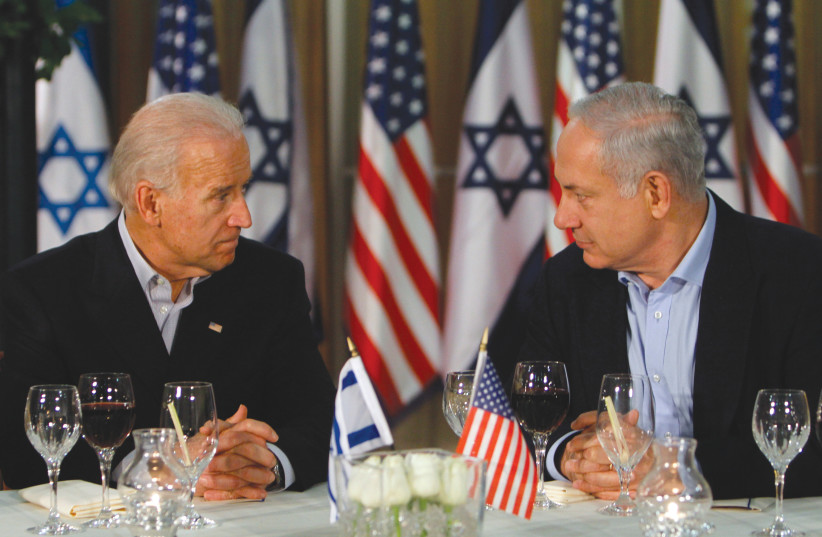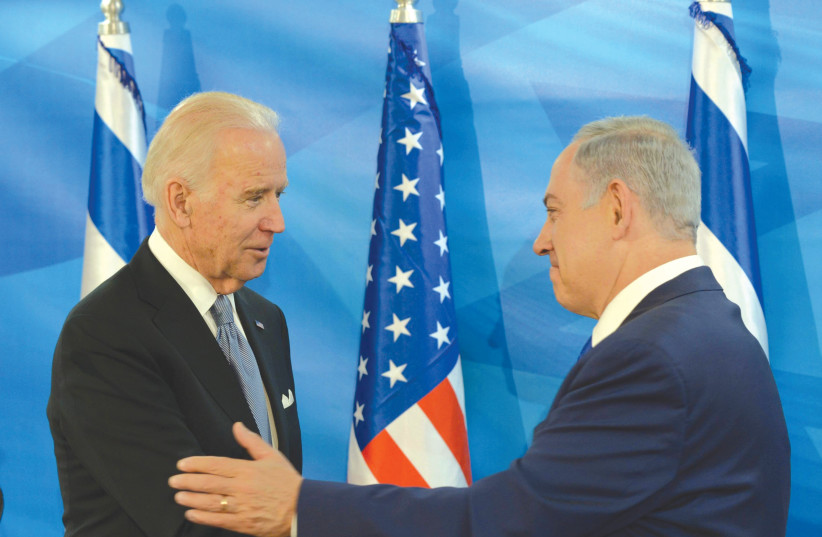Biden’s Netanyahu snub is a crisis that won’t die down anytime soon -analysis
Those who believe that the Israel-US crisis will die down should think again.
The only resolution is for President Joe Biden to invite Prime Minister Benjamin Netanyahu to the White House.
The problem is – Biden can’t do that now, a point he publicly drove home last Tuesday when asked if he would host Netanyahu. “No,” he said, “not in the near term.”
Biden’s answer was understated, given that he is unlikely to be able to invite Netanyahu as long as Israel’s domestic turmoil continues.
What is needed to proceed between the binational relationship?
At least two factors are needed.
First, it would have to be clear that the judicial reform process will not change Israel’s status as the only democracy in the Middle East.

Second, Biden would have to believe that while Netanyahu was in Washington an Israeli minister would not issue statements it could deem “repugnant,” a word the Biden administration used to characterize comments made by Finance Minister Bezalel Smotrich.That’s because it is not enough to just have a Netanyahu visit. There would also have to be polite comments to the camera at the top and possibly even some joint comments.That kind of joint photo opportunity is also a form of endorsement of the country and its government. Biden can’t trust that he will be able to do that.
Former ambassadors weigh in
Former US ambassador to Israel Daniel Shapiro elaborated on the difficulty of a Biden-Netanyahu White House meeting.
“It would be very awkward for Biden to have a meeting [with Netanyahu] just as Israel passes a judicial overhaul or just before they pass a judicial overhaul that many Israelis, including very senior people… say would be doing great harm to Israeli democracy,” Shapiro explained.
“One of the main themes of Biden’s presidency is defending democracy from erosion, from the threats to liberal governance,” Shapiro continued.
“That is true in the US and it’s also true internationally,” he emphasized. “So to have a meeting which he [Biden] certainly wants to have, to do all the normal business of coordinating US-Israeli positions on Iran, on the Abraham Accords [and on] all the things that we work on together, at a time when this step might occur is extremely difficult to manage.”
Former ambassador to the US Michael Oren concurred that tensions between Jerusalem and Washington would continue until a “compromise on reform” is reached.Netanyahu would also have to “find a way of reigning in the racists in his coalition. Then they can still have some differences over the peace processes, they can have differences over Iran, but then he will be invited to the White House,” Oren said.
 PRIME MINISTER Benjamin Netanyahu meets with Joe Biden at the Prime Minister’s Office in Jerusalem, in 2016 when Biden was US vice-president. (credit: AMOS BEN GERSHOM/GPO)
PRIME MINISTER Benjamin Netanyahu meets with Joe Biden at the Prime Minister’s Office in Jerusalem, in 2016 when Biden was US vice-president. (credit: AMOS BEN GERSHOM/GPO)Since Netanyahu’s coalition was sworn in at the end of December, US Ambassador to Israel Tom Nides has stressed the importance to Washington of knowing that Netanyahu was in charge of his coalition. “The prime minister has assured me he has his hands on the wheel. Hopefully, they are very tight on that wheel,” he told The Jerusalem Post already in January.Oren said the absence of control is a significant issue for the Biden administration.“The reason he [Netanyahu] is not being invited is not because they have differences over policy. The reason he is not being invited is because they do not believe he has his hands on the wheel,” Oren stated.
Constituting crisis
Both Oren and Shapiro, however, dismissed the idea of a US-Israel crisis. “We are not in a crisis yet, we are just not, we are in a period of tension,” Oren said.
He pointed to what he considered to be actual crises. In “1956 [former US president Dwight] Eisenhower threatened to sanction Israel because of the Suez Crisis.“In 1963 [former president John F.] Kennedy threatened to sanction us over Dimona,” he said. “In 1975 [former] president [Gerald] Ford comes out and threatens to cut off US aid if we do not give up the Sinai. I can go on. There was a crisis under [former president Ronald] Regan when we bombed the Osirak reactor. Another crisis [was] when we bombed Beirut. In 1982, we have Sabra and Shatilla. These are crisis points, We are not there yet,” Oren said.Israel could arrive at that point if there was “an even larger-scale settler pogrom against the Palestinians” or there was a government with no “judicial restraint” that did something like outlawing homosexuality, he said.What is happening is that Biden is angry and concerned about what is happening in Israel, Oren said. He underscored that Biden, along with Nides, Secretary of State Antony Blinken and National Security Advisor Jake Sullivan were all pro-Israel politicians.“They have stood up against the progressive wing of their own party,” which is dissatisfied that Biden has not reopened the east Jerusalem consulate and has not condemned settlements strongly enough, he said. The Biden administration has defended Israel’s right to self-defense in Gaza and has shown a willingness to cooperate on Iran, but “we did not make it easy for them,” he said.Shapiro said he believed the crisis point would come if Israel pursued judicial reform without a consensus process and in a way that harmed the country’s democracy.Democracy is a “foreign policy issue” for the US and Biden, he said.“If US interests could be affected and harmed then the US probably has a view on it and it’s perfectly legitimate for the US to express its view when its interests potentially will be harmed,” he said.“Israelis can decide whether to take that into account when they make the decision,” he said.Netanyahu has argued from the start that the reform process has been misunderstood, and that it will strengthen Israeli democracy. In his latest public speeches in the last week, he underscored the importance of an independent judiciary and stressed that individual rights would be protected.But it’s a message that has fallen on deaf ears in the Biden administration, which was concerned from the start, and as a result, an expected White House invitation never arrived. Initially, Nides made it seem as if one was forthcoming at any moment, with his optimizing making it seem as if US-Israel ties were on track.As the weeks dragged on it became more and more apparent, however, that this was not the case.After Biden clarified that, in fact, no invitation would arrive, US officials moved quickly to soften the blow. White House and State Department officials underscored their support of Israel and Blinken spoke with Foreign Minister Eli Cohen.But at the end of the day, the bottom line will now remain the same.Netanyahu is persona non grata in Washington and won’t be invited. At stake, however, is not just a trip, but a symbol of strong Israel-US ties as expressed in the handshake and the smile.An Israeli leader who is isolated from Washington and who can’t speak face to face with a US president is a leader who is seen not to have Washington’s ear and who is distanced somewhat from the West. Part of Israel’s strength on the international stage is derived from the belief that an alliance with the Jewish state opens doors in Washington.A fissure in those ties also has security implications, as it hints at the possibility that if the US doesn’t support Israel in the domestic arena, it might not do it elsewhere as well.The US-Israel relationship is complex, with more tentacles of cooperation than one can count, and this will continue, of course.But the disconnect at the top is here to stay for the near future and that creates a potential diplomatic and security problem for Israel, until such time Netanyahu heads to Washington, and that assumes that such a time arrives. JPost





Comments are closed.